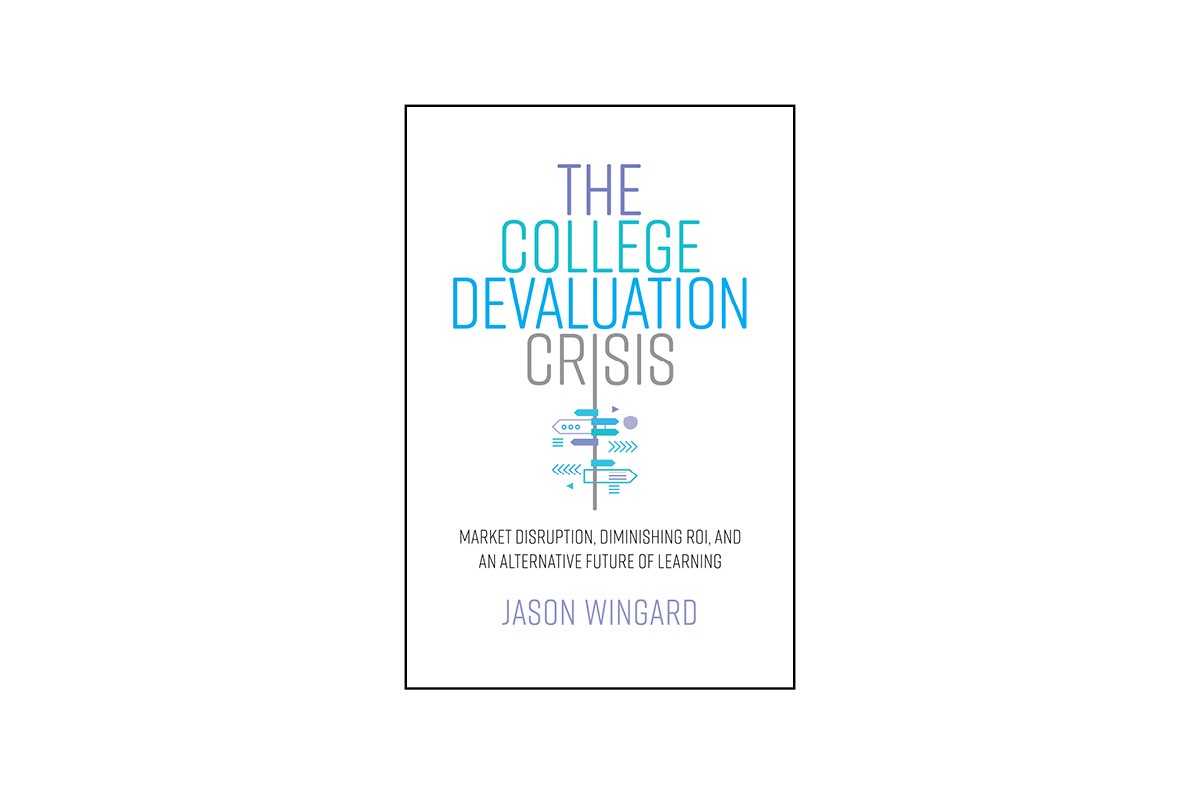While serving as a dean at Columbia University, Temple University President Jason Wingard observed a trend among highly competitive high school programs. Employers increasingly sought high school students to train directly into their businesses rather than students who completed four-year college degrees.
Wingard began to question whether a college degree was the best path forward for future success. After extensive research, he determined that if university systems did not adapt to employers’ needs, higher education would be bypassed in favor of alternate sources of training. In his new book, published this week, The College Devaluation Crisis: Market Disruption, Diminishing ROI and an Alternative Future of Learning, Wingard urges university systems to make a pivot in what is offered to prepare students for the workplace.
Corporate hiring practices are starting to favor skills over credentials, Wingard contends, and college degrees no longer guarantee professional achievement. The value proposition of the college degree is no longer keeping pace with rapidly evolving skill needs associated with technological advancements in today’s workplace. More and more, employers are stepping in to innovate new approaches to training talent—independently of higher education.
“When I was a dean at Columbia University overseeing competitive high school programs, I noticed a trend—an increasing number of employers inquired about hiring students directly out of high school, something not seen in nearly a century,” Wingard said. “When I asked corporate executives about this shift, they reported needing to address human capital management issues and catalyze change. To thrive in a constantly shifting marketplace, they could not rely exclusively on the same old college pipeline.”
At the same time, according to Wingard, the value of the college degree may be waning due to factors including affordability, curriculum relevance and the disruption in the workforce due to the COVID-19 pandemic.
“The slow-moving student debt disaster and the emerging skills gap issues underscore
that our higher education system needs a new measuring stick: outcomes,” said Randall Lane, editor and chief content officer at Forbes. “Dr. Jason Wingard has focused on that for years, which instantly makes The College Devaluation Crisis an essential part of this re-imagination.”
Recent figures from the National Student Clearinghouse Research Center show that 662,000 fewer students enrolled in undergraduate programs in spring 2022 than the previous spring, a drop of 4.7%. Since the beginning of the pandemic in March 2020, the number of undergraduates enrolled in college had dropped by nearly 1.4 million students or 9.4%. This data reflects a growing number of high schoolers and their families considering alternatives to higher education as a result of costs and data highlighting earnings potential through alternative avenues.
For students and their families, there are few expenses more costly than a college education. Wingard delves into the innovative solutions and partnerships that these future workers should consider—these include solutions that increase the value of higher education as they plan to prepare for the demands of the 21st-century economy.
“Higher education will need to undergo curricular restructuring in order to remain relevant as a pipeline into the workforce, and to satisfy talent needs more agilely and effectively,” Wingard said.
It’s not about dismantling, but reinventing education, according to Wingard, who penned The College Devaluation Crisis before becoming the president of Temple University a year ago. An expert in the future of work and learning, Wingard is adjusting Temple’s approach to education to meet employers’ expectations of skill sets and to ensure Temple graduates are competitive in the marketplace.
In the book, published by Stanford University Press, Wingard addresses how higher education can begin to realign its value proposition to synchronize with the change and innovation on the employer side and better position graduates for their careers.
“Employers are already developing their own models of training and of talent scouting—we can’t afford to wait,” Wingard said.
The book also offers strategies for talent development, training and credentials from major companies that managers can adopt for their firms. Chapters focus on major firms such as Google, Ernst & Young, and General Assembly to illustrate strategies for talent development across varying levels of individual education, age and background.
“Unlike most contemporary critiques, The College Devaluation Crisis does not stop at recounting all that is wrong with formal higher education but indicates where the solutions may lie,” said Angel Cabrera, president of Georgia Institute of Technology. “Drawing from his unique professional journey, Dr. Jason Wingard explores several innovative solutions and partnerships that are helping increase the value of higher education for students and employers and issues a much-needed call to change.”
– Deirdre C. Hopkins

